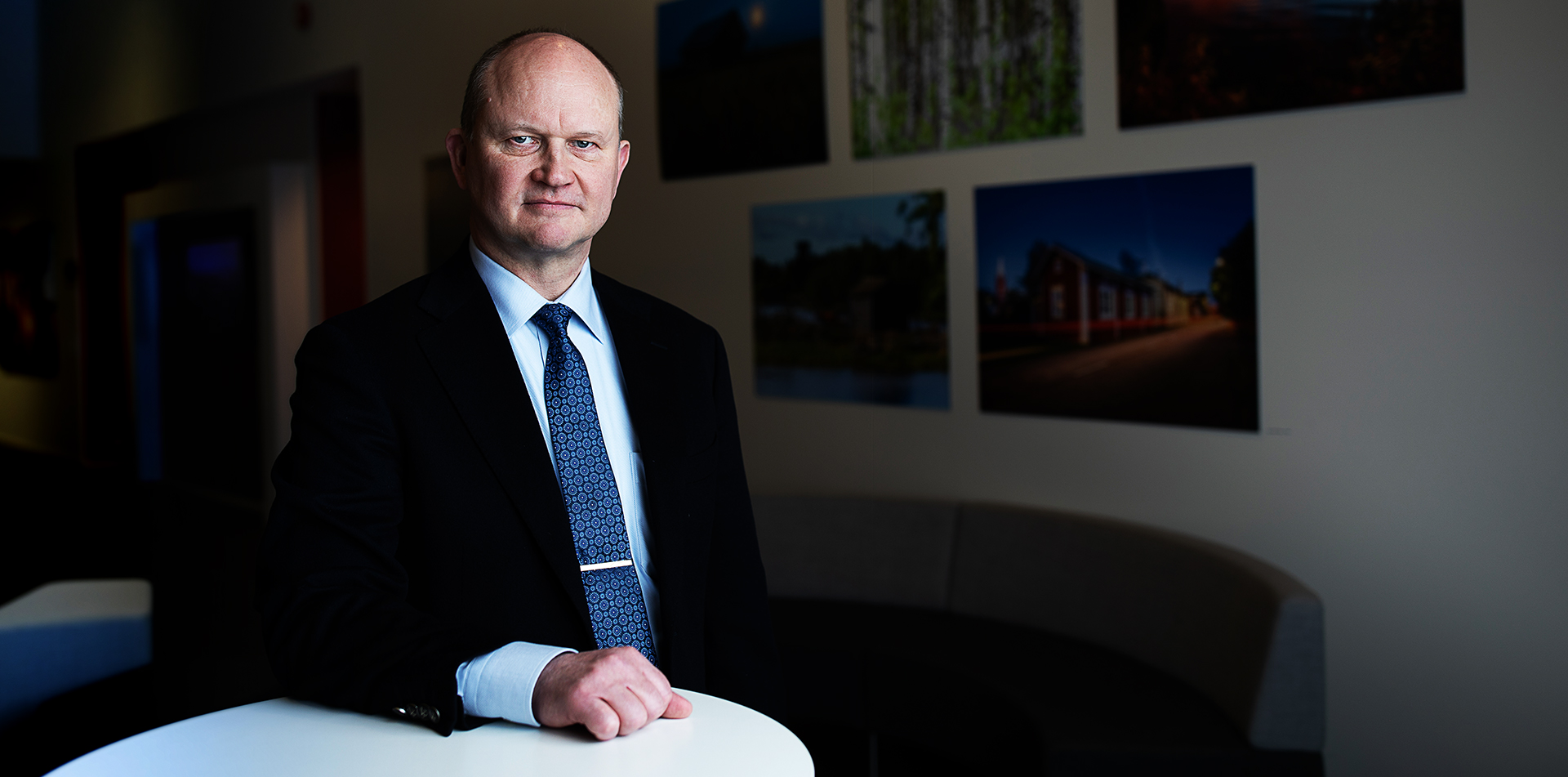
CEO’s Review
Towards a Clean and Sustainable World


Towards a Clean and Sustainable World
From a productional point of view, the year 2018 was a very successful one as more waste than ever before was processed in Westenergy’s Waste-to-Energy plant – 191 000 tonnes! A new record in district heat production was also achieved as in 2018, 364 gigawatt-hours of district heat was produced in the plant. This means that Westenergy was able to produce over 40 % of the district heat used in the Vaasa region.
The 5-year overhaul of the turbine translated into slightly lower production figures in the production of electricity and 106 gigawatt-hours of electricity was produced in Westenergy’s plant in 2018, this corresponding to the annual need of some 7 000 households. New records in the amount of waste and district heat production mean that the plant availability has been very high in 2018. Moreover, availability has improved constantly since 2015 which indicates that we have become better in planning the service stops and plant operation in general.
Goals were met also within occupational safety. Observing safety aspects is the starting point for work, and there has been no accidents at Westenergy’s plant site in three years! Systematic work to promote safety has paid off, and Westenergy is one of the first companies in Finland whose safety system is certified in accordance to the new occupational health and safety standard (ISO 45001:2018).
The well-being of the employees is important at Westenergy as a positive work atmosphere and good work motivation inspire the employees to work determinedly and actively to achieve the objectives. Last year, a study conducted on work atmosphere revealed that the work atmosphere at Westenergy was considered positive and people enjoyed their work. The study revealed also that there is still room for improvement, for instance, in the flow of information, and we are now concentrating on improving the information flow, for instance, with the help of a more user-friendly intranet and document control system. Additionally, the job descriptions of the administrative staff were defined more accurately, and responsibilities are now clearer.
I want to thank our staff for team-spirit and an active attitude to work. With a determined and rigid work, we were able to achieve the important goals set for 2018.
In 2018 we continued the work to carry out the flue gas scrubber investment. Companies were invited to tender for the supply contract at the end of the year, and the contract is to be signed at the beginning of next year. The aim is to get the scrubber installed and taken into use in 2019.
The incentive to invest in the flue gas scrubber was created by the BREF document (Reference Document on Best Available Techniques) which is now being prepared for. The document defines the best practices and flue gas emission limits for Waste-to-Energy plants in EU countries, and it is very likely that the emission limits will become stricter. With the plant’s current technology, we wouldn’t necessarily be able to respond to the new purification regulations, and, therefore, we made the decision to invest in the flue gas scrubber. The environmental permit for the scrubber was granted already in 2017.
The flue gas scrubber will complement the current semi-dry purification system of the plant, and it will significantly decrease the amount of acidic impurities (i.e. hydrochloric acid and Sulphur compounds) in the flue gases. At the same time, thermal energy in the flue gases can be recovered more efficiently, and the capacity of the plant to produce district heat will increase by approximately 20 percent. In this way, Westenergy’s role as the producer of district heating in the Vaasa area will become more significant, and Westenergy will take the area one step closer to coal-free energy production. The flue gas scrubber project has proceeded in time in co-operation with Vaasan Sähkö, and I would like to thank Vaasan Sähkö for a functional co-operation throughout the year.
The flue gas scrubber will complement the current semi-dry purification system of the plant, and it will significantly decrease the amount of acidic impurities in the flue gases.
The waste-to-energy field has been in a constant change especially during the last few years. Including the energy recovery of waste in emissions trading and the taxation of waste-to-energy were often mentioned as the future possibilities in the political discussions in 2018. As an alternative to these options, Westenergy together with interest groups and other companies operating within waste-to-energy field, presented a counter-proposal, a Green Deal contract to the Ministry of the Environment. We regard Green Deal as a more efficient solution for controlling climate change and promoting circular economy than emissions trading or the taxation of energy recovery of waste. This is, because not only the climate objectives, but also concrete action plans and schedules for achieving the objectives are outlined in the contract. The Ministry of the Environment has showed signs of approval for the Green Deal and the contract is currently being prepared. The contract will hopefully be signed in 2019. Green Deal would commit different parties to protecting the climate and promoting circular economy and would bring stability to the entire waste-to-energy field – stability that is long being longed for.
Westenergy supports different research projects and diploma work that are based on the concept of circular economy.
Last year we continued the development work together with Vaasanseudun Kehitys (VASEK) and Stormossen to create a circular economy cluster in Mustasaari. In the project, new and growing businesses in circular economy are being searched for, and material flows and companies operating within recycling in the region are mapped. To promote circular economy in the area, we organised ReThink seminar at Westenergy in cooperation with VASEK and the University of Vaasa. The seminar was held to make companies and decision-makers realise the benefits circular economy could offer. The role of municipalities in enabling the operation of circular economy companies was also discussed in the seminar. The speakers in the seminar included, for instance, the parliament members Joakim Strand and Susanna Koski. Feedback on the seminar was positive, and no chair was left empty.
Westenergy supports different research projects and diploma work that are based on the concept of circular economy. In the SHARE project, the ecosystems of circular economy in the context of waste-to-energy field were studied. Within the project, three master’s theses were completed: in one thesis, the changes in waste and procurement law and their impact on Westenergy were studied; in another thesis, an innovative way to assess the economic impacts and cost-effectiveness of using bottom slag was constructed, the third thesis being a plunge into the word of industrial symbiosis and produced an analytical description of the closed material flows of urban food production and waste-based energy production. In a project named Hydrophonix, utilisation possibilities of CO2 in fish farming were studied. Cooperation with students and educational establishments in the region is important to Westenergy as we aim at promoting circular economy in our operating area.
Westenergy has strengthen its role in circular economy as bottom slag can be used almost entirely: metals are recycled and used to produce new products, and the mineral fraction of the bottom slag is used in earthwork, road building and in the production of different concrete elements. Cooperation with Lakeuden Etappi and Suomen Erityisjäte in developing the processing of bottom slag has paid off.
Recycling metal is more environmentally friendly than the production of new metal products, and using the mineral fraction replaces natural sand and gravel. In this way, using bottom slag is a good representation of the principle of circular economy as the key idea in circular economy is that raw materials remain in use for a long time and that the harmful effects to the environment are minimised.
On a practical level, the decree on earthwork has enabled circular economy. Previously the possibilities to use bottom slag were reduced by the heavy environmental permit process but nowadays, only a simple notification procedure is required in order to use the bottom slag.
Using bottom slag is a good representation of the principle of circular economy.
Year 2018 was an eventful year and as Westenergy’s operating environment is changing rapidly, year 2019 is definitively going to be at least as interesting and challenging. We have developed Westenergy in close cooperation with the owners, the municipal waste management companies, and I would like to thank the owners for the year 2018.
As outlined in Westenergy’s strategy, we have started negotiations in order to widen Westenergy’s owner basis, and the negotiations will continue in 2019. By widening the owner basis, we aim at securing the extensive use of the capacity of Westenergy’s plant in the long run. In this way, we can ensure high-quality and more cost-efficient service for all the owners also in the future.
We have started an important strategy work in collaboration with the university of Vaasa, and in this work, the circular economy approach will be strongly present. In the strategy work, we will outline the direction Westenergy will be steered into and define what kind of a company Westenergy aims at being. The company board has worked actively and determinedly to outline the strategy of the company – for that and for the entire year I would like to thank the members of the board. Alongside the strategy work, we have started to reform the communication strategy and company image, and the results of the work will become visible in our communication material during 2019.
The founder member and a long-time board member and Chairman Håkan Anttila passed away in the beginning of the year. He was a member of the company board since the company was founded, and Westenergy was based strongly on his vision. It can be said that Westenergy was founded as a result of Håkan Anttila’s vision and persevering work, and that Westenergy’s WtE plant in Mustasaari started operation right on time regarding the changes in legislation, development in waste management and to answer to the local energy demand.
Olli Alhoniemi, CEO
